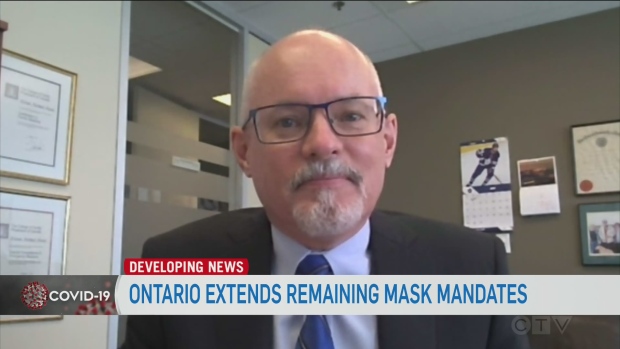
TORONTO — As Ontario continues to effectively manage the sixth wave of COVID-19, the Chief Medical Officer of Health is maintaining existing provincial masking requirements in select higher-risk indoor settings until June 11, 2022.
“To protect our progress in managing this latest wave, I am maintaining masking requirements in specific public settings where individuals who are, or may be, at increased risk of severe outcomes, are in close contact for extended periods of time,” said Dr. Kieran Moore, Chief Medical Officer of Health. “Continuing to follow masking requirements and keeping up to date with COVID-19 vaccinations are the best ways we can prevent transmission and protect our friends, families, and our communities.”
Provincial masking requirements which were set to expire on April 27, 2022 are being extended in current settings until 12:00 a.m. on June 11, 2022, including:
- public transit;
- health care settings (e.g., hospitals, doctors’ offices, clinics that provide health care services, laboratories, specimen collection centres, and home and community care);
- long-term care homes;
- retirement homes; and
- shelters and other congregate care settings that provide care and services to medically and socially vulnerable individuals.
A complete list of settings where masking requirements continue to apply is available online.
The Chief Medical Officer of Health will also maintain the CMOH Directives currently in effect until June 11, 2022, after which the ministry will issue guidance on personal protective equipment recommendations for infection prevention and control in health care settings.
Given the province’s high vaccination rates, expansion of booster doses, as well as the arrival of antivirals, Ontario has the tools necessary to manage the impact of the virus. The Chief Medical Officer of Health and the province will continue to monitor key indicators and the COVID-19 situation across Ontario.
Expanding Ontario’s Tools to Manage COVID-19 and Stay Open
While the province adapts to managing and living with COVID-19, the Ontario government is using every tool available to protect hospital capacity and ensure Ontario can stay open. This includes continuing masking in high-risk settings, expanding eligibility for fourth doses of the COVID-19 vaccine and expanding access to antiviral treatments such as Paxlovid.
To further expand the tools available to protect Ontarians and reduce hospital visits, the province will start to receive supplies of Evusheld, an antibody treatment for immunocompromised individuals who are not positive for COVID-19 at the time of administration. Following two single-dose injections, the treatment provides protection from COVID-19 for six months.
Based on advice from the Canadian Agency for Drugs and Technologies in Health (CADTH), Evusheld will be available to individuals with the highest-risk of a severe outcome from COVID-19 in the coming weeks, including:
- solid organ transplant recipients;
- stem cell transplant recipients;
- CAR-T therapy recipients; and
- other hematologic cancer patients undergoing treatment.
“Thanks to the province’s high vaccination rates as well as an increase in antiviral treatment availability and eligibility, we have been able to cautiously and gradually reopen Ontario,” said Christine Elliott, Deputy Premier and Minister of Health. “Vaccination remains our best protection against COVID-19, and I strongly recommend that everyone stays up to date with their vaccinations by receiving the dose you are eligible for as soon as you can. As with vaccines for other diseases, you are protected best when you stay up to date.”
“This is a peak of activity across Ontario right now.”
Dr. Kieran Moore says he’s ‘cautiously optimistic’ that cases and hospitalizations will slow over the next 7-10 days.
Watch the full interview: https://t.co/LS6zIjQTRM pic.twitter.com/50dar549jg
— CTV News (@CTVNews) April 24, 2022
Quick Facts
- Evusheld was approved by Health Canada on April 14, 2022. The province is expecting to receive its first shipment in late April, with subsequent shipments expected in May and June.
- Higher-risk groups are eligible to be tested and assessed for COVID-19 antiviral treatments, such as Paxlovid, in Ontario. Antiviral treatment may prevent severe disease in people who have COVID-19 symptoms. Individuals can access Ontario’s antiviral screener tool to help determine if they are at higher risk and should be assessed for treatment.
- Eligible individuals can book their fourth dose appointment through the COVID-19 vaccination portal or by calling the Provincial Vaccine Contact Centre at 1-833-943-3900, directly through public health units that use their own booking systems, through Indigenous-led vaccination clinics, participating pharmacies and participating primary care settings at a recommended interval of five months after receiving their last booster.
- Ontarians can access free rapid testing kits for at-home use. A list of participating retailers and more information on rapid tests for the general public can be found at Ontario.ca/rapidtest.
- PCR testing is available for eligible individuals at over 200 assessment centres and community labs, and at over 790 participating pharmacies. Visit Ontario.ca/
covidtestinglocations to find a testing location. - If you test positive on a PCR, rapid molecular or a rapid antigen test, you must isolate, except to seek testing and care. Visit Ontario.ca/exposed to learn more about isolation directions.
Source Province of Ontario

Leave a Reply